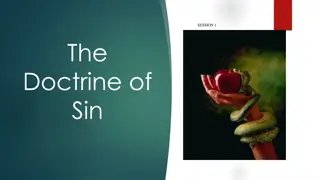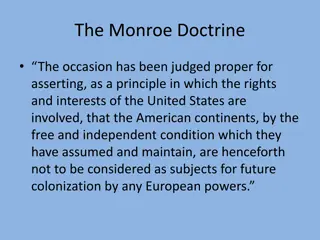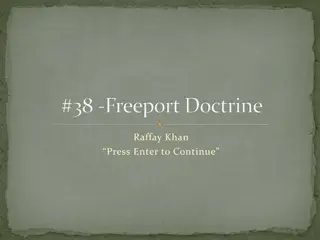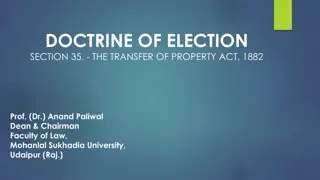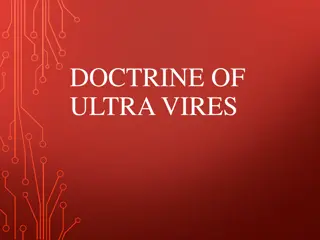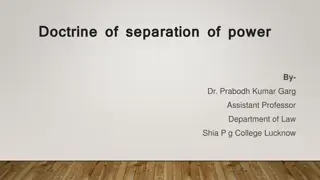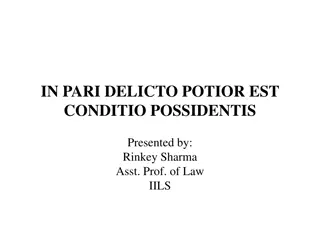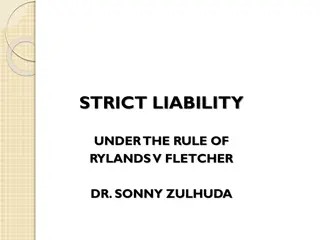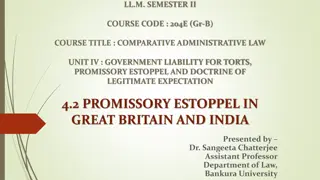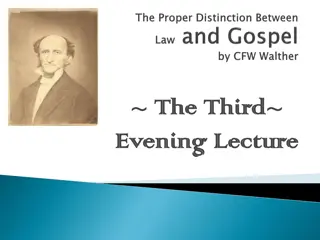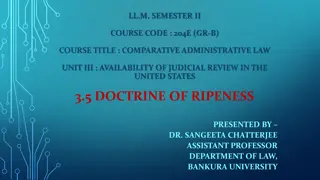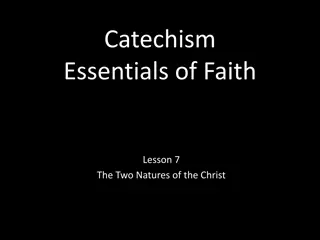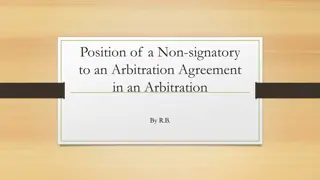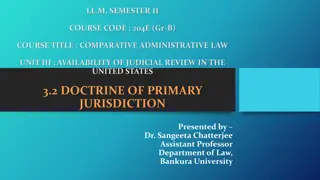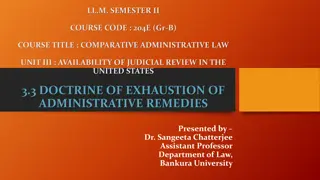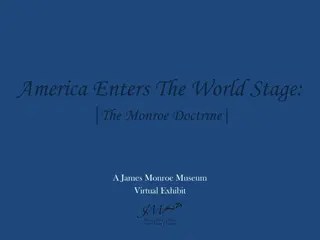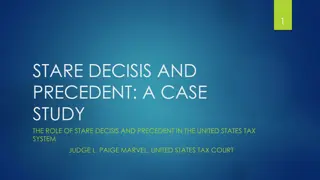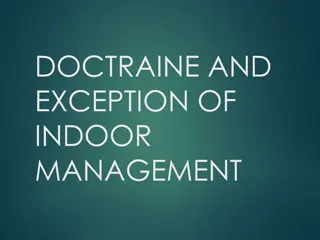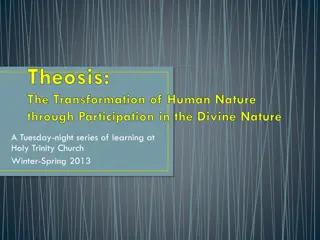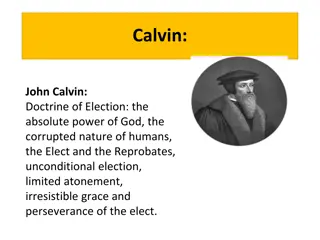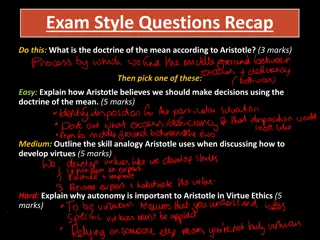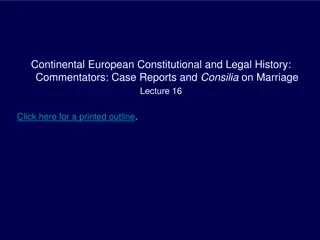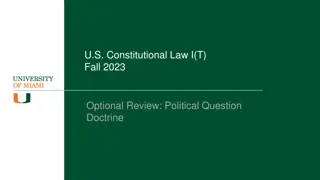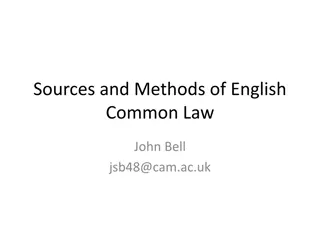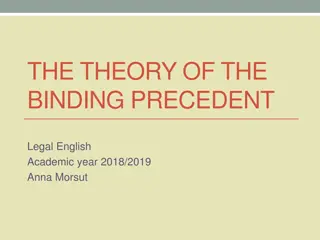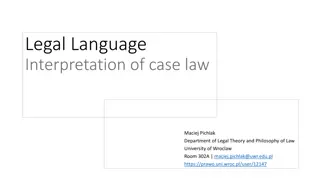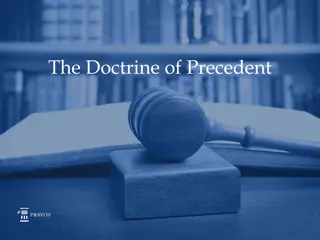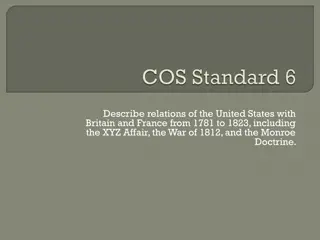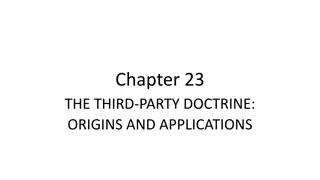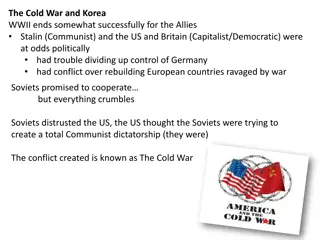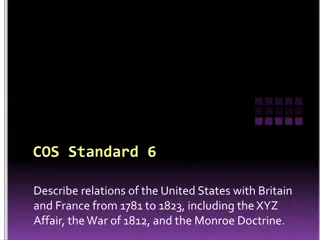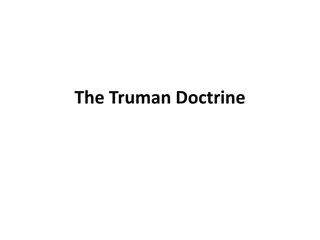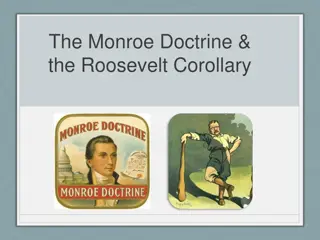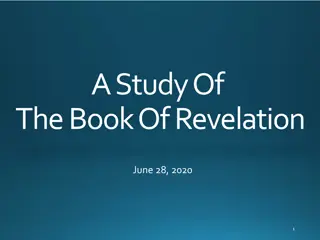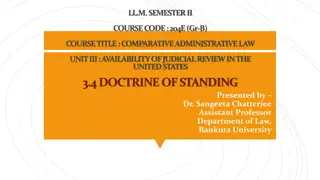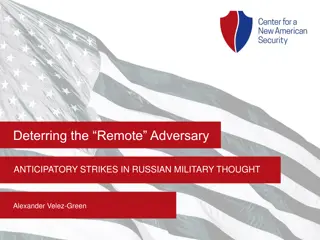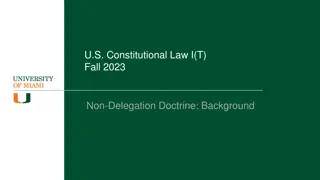Understanding the Doctrine of Sin in Christian Theology
Explore the profound impact of sin as a transgression against God's holiness, its existence, extent, consequences, and common misunderstandings. Delve into biblical references on sin's definition and the origin of evil in the world. Gain insight into the significance of doctrine in aligning beliefs
1 views • 18 slides
The Monroe Doctrine: A Declaration of American Independence
The Monroe Doctrine asserts that the American continents are not to be colonized by European powers and considers attempts to extend European systems into the hemisphere as dangerous. The United States declares its non-interference with existing European colonies or dependencies.
0 views • 8 slides
The Freeport Doctrine and Stephen Douglas: A Historical Overview
Explore the history of the Freeport Doctrine as articulated by Stephen Douglas during his debate with Abraham Lincoln. Learn about Douglas's views on slavery, popular sovereignty, and the implications of the doctrine on territorial governance. Delve into the background, significance, and relations t
1 views • 10 slides
Doctrine of Election under Section 35 of the Transfer of Property Act, 1882
The doctrine of election under Section 35 of the Transfer of Property Act, 1882 deals with situations where a person professes to transfer property he does not own, and the owner must elect to confirm or dissent. If the transfer is gratuitous and the transferor is unable to make a fresh transfer, th
5 views • 17 slides
Understanding the Doctrine of Ultra Vires in Company Law
The doctrine of ultra vires in company law pertains to acts that are beyond a company's legal powers or authority as stated in its memorandum of association. This concept categorizes acts as ultra vires the directors, articles of association, or the company itself, with implications such as void con
1 views • 11 slides
Understanding the Doctrine of Separation of Power by Dr. Prabodh Kumar Garg
The doctrine of separation of power, as elucidated by Dr. Prabodh Kumar Garg, emphasizes the distinct roles of the executive, legislative, and judiciary branches to maintain checks and balances in governance. Originated by Montesquieu, this principle safeguards against tyranny and ensures liberty by
0 views • 27 slides
Doctrine of In Pari Delicto in Legal Context
The doctrine of in pari delicto (Latin for "in equal fault") dictates that when parties are equally at fault, the possessor's condition is considered better, meaning a person engaged in wrongdoing cannot sue another for the same act. Exceptions include the adverse interest and innocent insider excep
0 views • 4 slides
Understanding Marshalling of Securities in Mortgage Law
Marshalling of Securities, as per Section 81 of the Transfer of Property Act, addresses the scenario where a property owner mortgages properties to different individuals. This doctrine ensures subsequent mortgagees are entitled to have debts satisfied from properties not mortgaged to them while prot
0 views • 20 slides
Strict Liability under the Rule of Rylands v. Fletcher
Strict liability under the rule of Rylands v. Fletcher establishes that a person who brings something onto their land that is likely to cause harm if it escapes is responsible for any resulting damage, regardless of negligence. The case of Rylands v. Fletcher (1868) set the precedent for this doctri
0 views • 17 slides
Understanding Promissory Estoppel in Comparative Administrative Law
Estoppel and specifically Promissory Estoppel have evolved as important legal doctrines to prevent injustice and ensure that promises made are upheld. This concept is explored in the context of administrative law, particularly looking at government liability for torts, the doctrine of legitimate exp
0 views • 12 slides
Army Leadership Doctrine Update: ADP 6-22.1 Highlights
New Army Doctrine Publication (ADP) 6-22.1, "Army Leadership and the Profession," emphasizes the foundational principles of leadership with updated content and guidance. It covers essential leadership traits, values, competencies, and behaviors, providing insights into effective leadership practices
1 views • 6 slides
Understanding the Difference Between Law and Gospel in Doctrine
Exploring the critical distinction between the Law and the Gospel in Christian doctrine, this content emphasizes the diverse roles each plays in addressing spiritual needs. It warns against the dangers of false doctrine and highlights how the Gospel offers comfort while the Law exposes sin. The impo
1 views • 25 slides
Understanding the Doctrine of Ripeness in Judicial Review
The doctrine of ripeness in judicial review focuses on the timing of court intervention, ensuring that cases are mature enough for adjudication. It aims to prevent premature decisions and conflicts with other branches of government, emphasizing the need for cases to be fit for judicial review before
0 views • 12 slides
Understanding the Two Natures of Jesus Christ in Christian Doctrine
The concept of the two natures of Jesus Christ, divine and human, is explored through various biblical references and historical heresies such as Docetism. The struggles over the doctrine of the Trinity and the nature of Christ are interconnected, emphasizing the importance of understanding Christ's
6 views • 13 slides
The Doctrine of Privity and Non-signatory in Arbitration
The Doctrine of Privity in contract law states that only parties to a contract can enforce its terms, excluding third-party beneficiaries. However, in certain cases, such as piercing the corporate veil or involving group companies, non-signatory affiliates may be bound by an arbitration agreement. T
5 views • 16 slides
Understanding Doctrine of Primary Jurisdiction in Comparative Administrative Law
The doctrine of primary jurisdiction plays a crucial role in determining whether a court should yield to an administrative agency for certain issues. It helps in deciding which tribunal should take the initial action, especially in cases involving administrative discretion. This doctrine allows cour
1 views • 14 slides
Doctrine of Exhaustion of Administrative Remedies in Comparative Administrative Law
The doctrine of exhaustion of administrative remedies requires litigants to pursue all available remedies with administrative authorities before seeking judicial review. Originating from the case of Myers v. Bethlehem Shipbuilding Corp, this doctrine aims to respect congressional intent and promote
1 views • 12 slides
America Enters the World Stage: The Monroe Doctrine Virtual Exhibit
James Monroe's significant impact on American foreign policy, particularly through the Monroe Doctrine, is showcased in a virtual exhibit exploring his presidency and diplomatic legacy. From the Monroes' ambassadorial attire in Paris to the historical context of the doctrine's proclamation, delve in
1 views • 20 slides
The Role of Stare Decisis and Precedent in the U.S. Tax System
The United States tax system relies on the principles of stare decisis and precedent to ensure consistency and fairness. The Constitution grants Congress the power to levy taxes with specific limitations. Federal courts play a crucial role in interpreting tax laws and resolving disputes, with a stru
1 views • 17 slides
Understanding the Doctrine of Indoor Management
Doctrine of indoor management implies that a company's internal affairs are its responsibility, allowing outsiders to assume that directors act within their apparent authority. This doctrine, originating from the case of Royal British v/s Turquand, protects outsiders under certain conditions. Constr
0 views • 11 slides
Theosis: The Transformation of Human Nature in Christian Doctrine
Explore the concept of theosis, the transformation of human nature through participation in the divine nature, as seen in Biblical foundations such as Genesis, Psalms, and New Testament writings. Delve into questions about the development of this doctrine, its manifestation in worship, and its relev
2 views • 30 slides
John Calvin's Doctrine of Predestination: A Summary
John Calvin's doctrine of predestination revolves around the absolute power of God, the corrupted nature of humans due to original sin, and the concepts of the Elect and the Reprobates. Calvin believed in unconditional election, limited atonement, irresistible grace, and the perseverance of the elec
0 views • 21 slides
Understanding Aristotle's Doctrine of the Mean and Voluntary Actions
Explore Aristotle's doctrine of the mean, the skill analogy used in developing virtues, the importance of autonomy in virtue ethics, and the distinction between voluntary and involuntary actions in moral responsibility as discussed in his Nicomachean Ethics.
0 views • 22 slides
European Legal History: Precedent and Case Reports
Explore the evolution of case reporting and precedent in Continental European legal systems, highlighting the similarities and differences with Anglo-American common law. Discover how academic commentary and case material influence legal development on the European Continent.
0 views • 35 slides
Understanding Political Question Doctrine in U.S. Constitutional Law
Explore the intricacies of the Political Question Doctrine in U.S. Constitutional Law, focusing on key aspects such as textually demonstrable commitment, lack of judicially manageable standards, and the impact of standing on legal cases. Scholars debate whether the doctrine is jurisdictional and its
0 views • 20 slides
Understanding English Common Law and Judicial Precedent
Explore the sources and methods of English Common Law, key concepts like stare decisis and precedent, the use of cases in judgments, English and Welsh courts structure, the role of the Supreme Court, a case example, and styles of judgment. Learn about ruling components like Ratio decidendi and Obite
0 views • 16 slides
Understanding the Theory of Binding Precedent in Legal English
Explore the concept of binding precedent in legal English, focusing on how similar cases are treated alike in civil law and common law systems. Learn about the history behind the establishment of binding precedents and the role of key entities like the Incorporated Council of Law Reporting. Delve in
0 views • 12 slides
Understanding Binding Precedent in Legal Interpretation
The concept of binding precedent, also known as stare decisis, plays a crucial role in legal decision-making across different legal systems. This principle ensures that lower courts are bound by the decisions of higher courts, while also allowing for exceptions under specific circumstances. Key case
0 views • 8 slides
Understanding the Doctrine of Precedent in the UK Legal System
The doctrine of precedent, also known as stare decisis, is a fundamental principle in the UK legal system that requires courts to follow previous decisions on similar facts. This system ensures consistency and predictability in the application of law. The hierarchy of courts dictates the binding nat
0 views • 21 slides
The United States Relations with Britain and France from 1781 to 1823
The relations of the United States with Britain and France from 1781 to 1823 were marked by significant events such as the XYZ Affair, the War of 1812, and the Monroe Doctrine. The XYZ Affair strained relations with France, while the War of 1812 saw conflicts with Britain, including the burning of W
0 views • 27 slides
Ethical Debate on Euthanasia: Rachels' Critique of AMA Doctrine
James Rachels challenges the American Medical Association's distinction between active and passive euthanasia, arguing that it lacks ethical justification. The AMA doctrine permits passive euthanasia but forbids active euthanasia, leading to potential prolonged suffering for terminally ill patients.
0 views • 20 slides
Understanding the Third-Party Doctrine in Privacy Law
The discussion covers the origins and applications of the third-party doctrine in privacy law, referencing the landmark case of Smith v. Maryland. It explores concepts like pen registers, Katz test, and phone users' awareness of privacy regarding their call information. The implications of sharing i
0 views • 78 slides
The Cold War and Its Impact: Truman Doctrine, Marshall Plan, and Iron Curtain
The Cold War emerged from the tensions between the Communist Soviet Union and the Capitalist Democratic US and its allies after WWII. The conflict led to the Western Bloc led by the US and the Eastern Bloc led by the Soviets. The US implemented the Truman Doctrine and Policy of Containment to preven
0 views • 14 slides
Relations of the United States with Britain and France (1781-1823): XYZ Affair, War of 1812, Monroe Doctrine
During the period 1781-1823, the United States navigated complex relations with Britain and France. Key events include the XYZ Affair, War of 1812, and the Monroe Doctrine. From negotiating treaties to facing demands for bribes, the U.S. asserted its position on the global stage amidst political tur
0 views • 24 slides
The Cold War Events: Truman Doctrine, Marshall Plan, Berlin Airlift, American Responses, NATO & Warsaw Pact
The Cold War era saw significant events such as the Truman Doctrine, where the US aimed to support free peoples against communism. The Marshall Plan and the Berlin Airlift helped in the recovery of Europe post-WWII. American responses included the creation of CIA, NSC, and the Department of Defense.
0 views • 11 slides
The Monroe Doctrine and the Roosevelt Corollary: Evolution of US Foreign Policy
The content explores the historical context and evolution of US foreign policy through the Monroe Doctrine of 1823 and the Roosevelt Corollary of 1904. It discusses the principles outlined in each doctrine, their implications on US interactions with other nations in the Western Hemisphere, and the s
0 views • 4 slides
Understanding Doctrine in the Book of Revelation
Exploring the key themes of doctrine, truth, and error in the Book of Revelation through the lens of the Church at Pergamum. It delves into the challenges of tolerating false teachings while emphasizing the importance of discerning truth from falsehood based on biblical principles. The text highligh
0 views • 21 slides
Understanding the Doctrine of Standing in US Judicial Review
The doctrine of standing in United States judicial review is explained, focusing on the capacity of a plaintiff to seek judicial review based on injury-in-fact, causation, and redressability. The requirements of the standing doctrine and its relation to Article III of the US Constitution are discuss
0 views • 12 slides
Russian Anticipatory Strike Doctrine: Implications and Considerations
Exploring the concept of Russian anticipatory strikes in military thought, this brief delves into the potential motivations, strategies, and targets of such actions. From seizing strategic initiative to engaging deep enemy territory, the implications for U.S./NATO relations are significant. Understa
0 views • 13 slides
U.S. Constitutional Law I(T) Fall 2023: Non-Delegation Doctrine Overview
Exploring the Non-Delegation Doctrine in U.S. Constitutional Law, this content delves into the background, current doctrine, historical cases, and contextual considerations related to congressional delegation of regulatory powers. It addresses the constitutionality of Congress authorizing bodies suc
0 views • 46 slides
